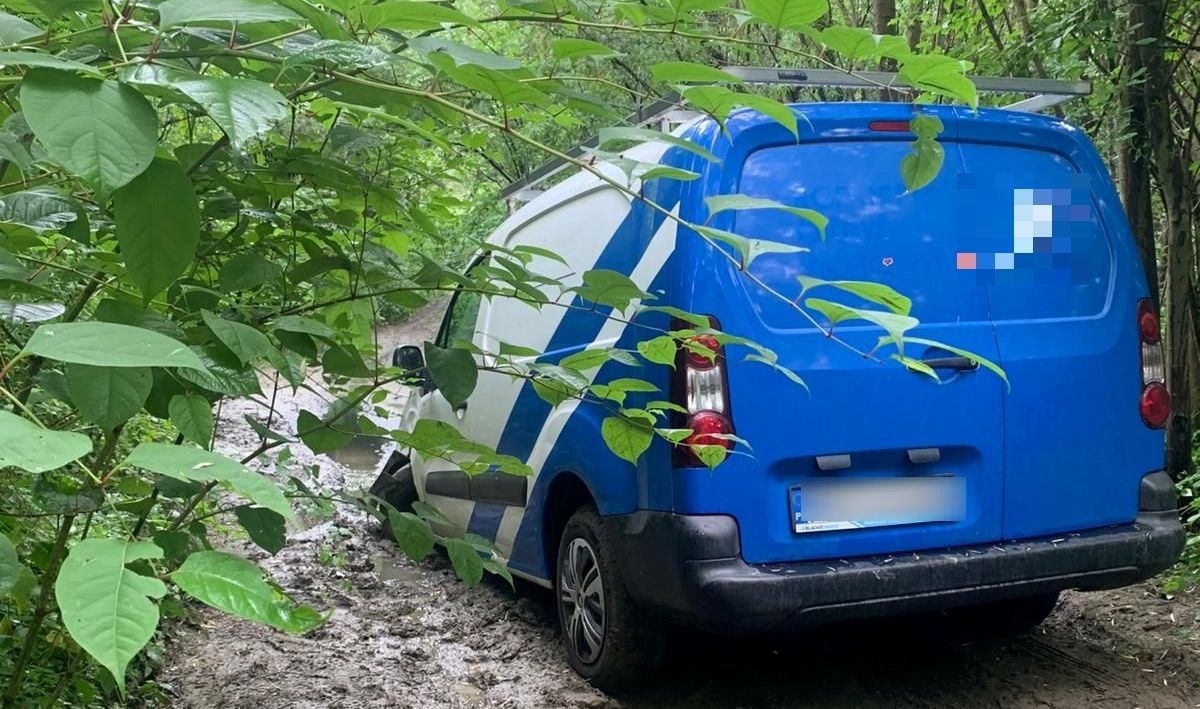Lobster-Chasers Gather In Florida For The Thrill Of The Early Hunt
Authored by T.J. Muscaro via The Epoch Times (emphasis ours),
“The Turk” was anchored off near the southern tip of Florida, and the small boat had divers in the water when a large fishing vessel cruised directly over the dive site.
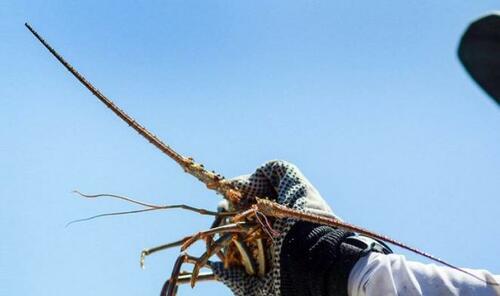 A man holds one of the lobsters that he caught during the two-day mini-season in Miami on July 28, 2010. Joe Raedle/Getty Images
A man holds one of the lobsters that he caught during the two-day mini-season in Miami on July 28, 2010. Joe Raedle/Getty ImagesThe smaller boat’s owner, dentist Jeff Pacha, watched furiously, anxiously. He worried, knowing as little as 13 feet of water might separate his wife and daughter—the two divers searching for lobsters on the ocean floor—from the intruder’s two sharp propellers.
Despite Pacha’s diver-down flag, the incoming boater idled across the area, presumably looking for a spot to anchor within the 100-yard safety perimeter the flag commands in open water.
Pacha waved and shouted. And the other vessel eventually turned and slowly moved away.
Pacha’s wife and daughter were able to return to the surface unharmed. But the scene repeats far too often this time of year, sometimes with deadly consequences, Pacha told The Epoch Times.
The dangerous encroachment illustrates the risks of seeking what’s known as a tasty treasure during Florida’s annual lobster mini-season.
During this year’s mini-season, which ran from July 24 to 25, one diver was hospitalized after being struck by a boat. Two other boating accidents required rescues, according to the Florida Fish and Wildlife Conservation Commission (FWC).
During the two days of early lobstering, the Monroe County Sheriff’s Office alone issued at least 12 citations requiring boat operators to appear in court, and they stopped more than 500 vessels for inspections.
What caused excitement to boil over was the annual early chance to find Florida’s spiny lobster.
The state’s regular season for lobster runs from midnight on Aug. 6 until a minute before midnight on March 31. The first two weekends are the busiest, Pacha said.
But for two days every summer, enthusiasts from around the country dive into what could be their best chance to seize their share of the most expensive item on the menu.
Lobsters. Right there for the taking. Straight from the ocean.
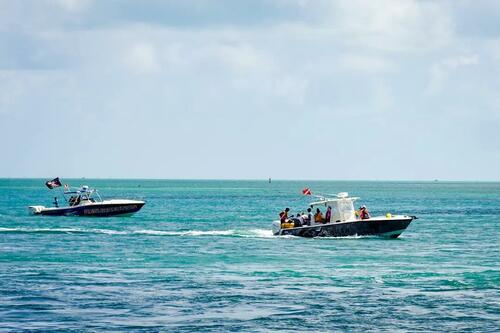 Boats filled with lobster divers speed past each other in Florida on July 25, 2024. T.J. Muscaro/The Epoch Times
Boats filled with lobster divers speed past each other in Florida on July 25, 2024. T.J. Muscaro/The Epoch TimesHow to Catch a Feast
Divers are required to purchase a lobstering permit, a $5 add-on to a $17 saltwater fishing license.
Then they legally can seek the quarry that hides in shallow, warm, tropical waters.
The red, 10-legged crustacean with a spiky exoskeleton is prized for the meat in its tail. The Florida variety doesn’t have large, meat-filled claws, like its New England cousin.
Wild lobsters hide during the day under outcroppings of rock, wood, and other large objects. To get them out, divers swim to the ocean floor, find a likely hiding place, and poke into it a long metal stick. They try to “tickle” the “bugs”—as the creatures are called by those who hunt them—out of their holes and catch them in a net as they flee.
Down on the sandy ocean floor, Nicki Pacha, 25, and her mother Dee Pacha, 67, circled a cluster of coral and rock. They could see lobsters huddled within.
They poked their ticklers under the rock, gently jerking them in a scooping motion. The goal was to coerce the lobsters to exit the hiding place and swim past them.
They’d have to act fast to position their nets right at the mouth of the lobster’s hide-out. If everything goes according to plan, the lobster will swim right into the trap.
If a lobster is caught, a gloved diver first must flip it over to check for eggs that may be clinging to the bottom side of its tail. If there are no eggs, the diver next must use a measuring stick to check its size.
If the protesting bug passes inspection, it gets zipped up in the bag bound for the surface.
For a lobster to be a “keeper,” the carapace—the firm shell covering the head and legs—must be at least three inches long. Any lobster that’s smaller or is carrying eggs must be released.
Captain Tony Young, owner-operator of Forever Young Charters in Islamorada, compared the two days of early lobstering to the opening day of any hunting season. The opening days offer lobsters aplenty, he told The Epoch Times.
“It’s the best time of the year to catch lobster in the state of Florida.”
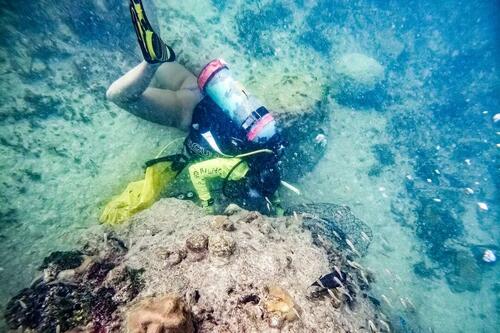 Nicki Pacha looks for lobsters in the waters off Summerland Key, Fla., on July 24, 2024. T.J. Muscaro/The Epoch Times
Nicki Pacha looks for lobsters in the waters off Summerland Key, Fla., on July 24, 2024. T.J. Muscaro/The Epoch TimesBoat or No Boat, the Hunt Is On
A boat isn’t even a requirement.
Along U.S. Highway 1, boatless lobster hunters park their cars along the side of the road and wade into shallow water.
They climb out of their vehicles, donning an array of wetsuits, rashguards, and bathing suits. They awkwardly carry nets, fins, and dive flags under their arms. They step out cautiously on the rocky coastline and plunge into the water.
Later, the waterlogged variants waddle back to their vehicles, many with bags brimming with lobsters.
Aaron and Jenny Prost stood on the shoreline at the southern end of Marathon, a city on a narrow stretch of land in the middle of the Florida Keys, watching their boys hunt in the shallow waters on the second day of mini-season.
The couple from Venice, Florida, has gone on diving adventures together for years. This was the first time their two sons joined in on the fun, hoping to bag a few keepers.
Suddenly, their oldest, Samuel,14, popped up next to his diver-down flag about 50 yards from the shoreline.
“I got one!” he shouted.
But he wasn’t sure his catch was big enough to keep.
His father shouted back instructions on how to take a proper measurement, telling him to keep the lobster in the water until they knew for sure, according to state regulations. Lobsters, like fish, have to remain underwater to breathe.
Making sure to gently hold his catch below the water’s surface, the teen shuffled toward the shore for help. After a few moments, his father announced bad news: the lobster was millimeters too short.
Samuel groaned and slumped, then trudged back out from the shore to put the lobster back where he’d found it.
He’d faced a harsh reality of lobstering: It’s not as easy as advertised.
Lobsters are fast and tricky, and divers require a certain set of skills to catch them.
All the energy spent swimming in open water, all the time spent holding one’s breath, and all the effort spent struggling to stay down, stay level, tickle, and grab a lobster can leave a diver empty-handed.
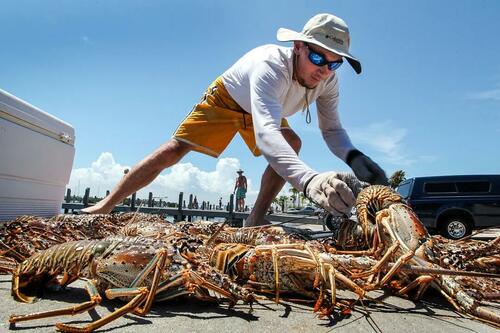 A man prepares the lobsters he caught on the first day of the mini-season in Miami on July 28, 2010. Joe Raedle/Getty Images
A man prepares the lobsters he caught on the first day of the mini-season in Miami on July 28, 2010. Joe Raedle/Getty ImagesKeeping It Legal
Jeremiah Wann and his family from Mercer, Pennsylvania, rounded up about 10 lobsters during mini-season by snorkeling right off the pier of their vacation home on the ocean side of Tavernier, Florida.
The Wann boys—Holden, 16, and Lennon, 14—already knew the struggle of finding lobsters large enough to keep.
After four years of working on their lobstering skills, they’ve steadily improved, they told The Epoch Times. But they know the disappointment of catching lobsters too small to keep.
Plenty of others were caught ignoring the rules this mini-season. And that can bring serious consequences.
“The possible penalty for possession of each undersized lobster is up to 60 days in jail, a $500 fine, or both,” according to the Monroe County State Attorney’s Office.
Of the dozen citations issued over the two days by the Monroe County Sheriff’s Office, most were for possession of too-small lobsters.
Lobster hunters face the same maximum penalty for taking a lobster with eggs, using a spear to catch one, or taking more than the law allows. Each violation may be charged separately.
State regulations allow divers to harvest six lobsters per day and 12 for the entire mini-season. A larger limit can be earned by helping the FWC eliminate an unwanted species from Florida waters.
Pacha and his family have taken that bait.
They participate in the FWC’s annual lionfish challenge, which offers prizes for divers helping to remove the venomous, invasive fish from reefs.
One of the prizes is a coin worth the right to take two extra lobsters during the mini-season. It’s earned by catching at least 25 lionfish or a combined total weighing at least 50 pounds.
By the end of the day, the Pachas had filled their boat’s cooler with 16 angry, snapping lobsters. They toasted their success with cold beer and later reflected on their close call.
While underwater, Nicki Pacha, 25, heard the idling of a boat above her, engines revving and clicking in and out of gear. She and her mother exchanged glances.
The 25-year-old medical student has been exploring underwater for about 20 years, both as a free diver and later as a scuba diver. Her parents have been diving together for 35 years.
Was it their family’s emergency signal? Three revs of their boat’s engine would be a call to surface.
Read more here…
Tyler Durden
Tue, 08/20/2024 – 21:45











